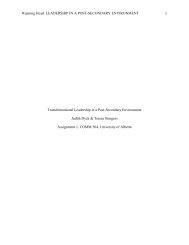CUBA'S - techlife magazine
CUBA'S - techlife magazine
CUBA'S - techlife magazine
Create successful ePaper yourself
Turn your PDF publications into a flip-book with our unique Google optimized e-Paper software.
From far left, a student in a fourth-period Electricity class at CNCI; CNC machine training on computers provided by<br />
NAIT; Fourth-period Electricity student maréa gámez Lambert is one of a growing number of Cuban women learning<br />
trades; CNCI on the 10th anniversary of the beginning of its project with NAIT.<br />
deficit, opening up the country to a world of economic<br />
possibilities.<br />
“Energy is the base of the development of modern<br />
society,” says Longoria. But he’s mindful of taking<br />
too much credit. “The Energy Revolution is huge. We<br />
were only able to provide a piece of sand in that bigger<br />
picture. But we are really proud.”<br />
back in havana, the officers of MINBAS, one of Cuba’s<br />
most powerful ministries, pay close attention to<br />
progress and achievements at the school.<br />
“One of the key points of the Revolution has<br />
been education for the Cuban people,” says Daysi<br />
Pineda Sánchez. As the Ministry of Basic Industry’s<br />
vice minister, Pineda oversees 120,000 workers and<br />
seven industry-related schools, CNCI among them.<br />
With respect to realizing Cuba’s economic potential,<br />
education has continued to play a central role in the<br />
country. “One of the key focuses of the training at CNCI<br />
is not only to help prepare operators and maintenance<br />
people for industry, but to increase productivity.”<br />
Boosting productivity is a priority of the Cuban<br />
government, and it can happen in two ways. The<br />
first is to realize the better, faster, safer workforce of<br />
Longoria’s aims. The second – especially important<br />
given the government’s announcement last September<br />
of 500,000 state worker layoffs – is to attract more<br />
foreign investors (that is, new employers).<br />
That might seem contradictory to the<br />
nationalization of foreign and domestic privately owned<br />
businesses following the Revolution. But today, the<br />
government considers carefully managed international<br />
partnerships necessary for growth. A good example<br />
sits right down the road from the school: the oil refinery,<br />
currently ramping up as a joint venture with Petróleos<br />
de Venezuela SA. Training that facility’s staff ranks high<br />
amongst the school’s next projects.<br />
“Foreign investment is important to the development<br />
of the Cuban economy,” says Arnoldo Rodríguez<br />
Lubían, specialist with the Ministry of Foreign Trade and<br />
Investment. “With the development of [CNCI] it will be<br />
possible that the workers needed by foreign investors<br />
could be covered with the Cuban workforce. That’s good<br />
not only for Cuba but also for the foreign countries that<br />
invest here.”<br />
“Ten years ago the country and the government were<br />
struggling to find men and women who were prepared<br />
to go out into industry and work,” says Pineda.<br />
v4.2 2011 29










